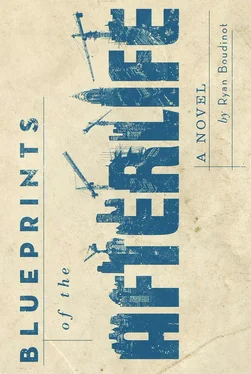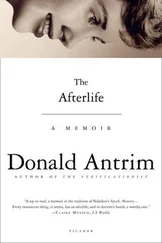Abby touched a picture of Sylvie and Bertrand magneted to the fridge. Even though Gavin was talking about someone else, Abby still protectively folded her arms over her chest as if Bertrand/Gavin was bringing secrets of her own out into the open.
“Bertrand was a bald guy?” Abby said, “Kind of tall? Black-frame glasses?”
“That was me all right,” Gavin said.
“I thought you were Gavin.”
“Right, right. It’s tricky. You know, a month ago there was me—Gavin—and there was Bertrand, and we were two separate people. I mean, I’m gay. It’s a little freaky to me to represent a straight guy. But I don’t know, something about wearing his clothes, eating his food, reading his books. Now it’s like I inhabit the guy. As if I just stepped into a museum but instead of exhibits there are all these lives on display. And the whole place is run by newmans, the ones actually doing all the work, so we humans just get to come in and start acting out the lives of people who died at the beginning of the FUS.”
Gavin reminded Abby of old boyfriends, guys of limited intelligence and half-baked ambitions. Guys who got too excited about plans that never came to fruition. College sports enthusiasts. “Like we’re wearing ghosts,” she said.
“Exactly,” Gavin said. “Can I trust you with something? As someone representing the girlfriend of the guy I’m representing?”
“Sure, okay.”
“I think I’m having Bertrand’s dreams. I dreamed about you two nights ago. In the dream you were Sylvie but your voice was exactly the same as your voice right now. I thought I could figure out what I was supposed to do with my life in this city. But it got hijacked by Bertrand’s life. I’m eating different foods. I listen to strange old German electronic music. I make references to books I’ve never even read.”
Abby nodded. “This city is a kind of afterlife.”
None of this belonged to her. Not the asphalt and billboards she could see from the window, not the furnishings of this one-woman apartment. It was as though she had come into possession of an artifact she had no idea how to protect. Stepping from the building into the street she inhaled to the point of flattening her nostrils and swallowed particles of dust from the infancy of construction. Two cabbies conducted a shouting match in a long-extinct African tongue. She picked a direction—uptown—and started walking. Everywhere these false-looking humanoid figures with Manga features and plastic hair trotted out of buildings and conveyed themselves earnestly toward new projects. Here and there empty spots where buildings were supposed to go gaped like horrible wounds. The rectangle comprised of Tenth and Eleventh streets and Fifth and Sixth avenues remained as it had been on Bainbridge, a grassy patch of suburban houses and part of an elementary school. It appeared as though a gigantic buzz saw had cut around this swath of the island. The cross section of a two-story house immediately bordered Sixth Avenue, its rooms like chambers of a heart revealed in ultrasound. Behind that house, part of a crumbled two-lane road abutted what was now Eleventh. It wouldn’t be long before the contents of this block were scraped like icing off a cupcake and dumped onto one of the outgoing barges, the leftover space erupting in mirrored office buildings. A garbage truck loaded with meticulously replicated pieces of the dead city’s trash—Styrofoam packing material, fast-food cups, kitty litter—lumbered by. Abby paused in a doorway to catch her breath. This place, this dream, what was it? A video game mating with physical reality? A movie set? The overcrowded basement of some demented dreamer’s vision of Heaven?
The next day after a fitful sleep she found the nearest subway station and rode uptown to the Upper West Side amid others who, like her, warily occupied apartments of the dead. In exchanged glances they communicated how long they’d been here, conveying the jitters of a newbie or the resigned calm of those who’d grown comfortable in their new personas. Abby climbed the stairs at an uptown stop, emerging from the piss-scented station into deep forest, where gilded light streamed through boughs of red cedar and hemlock. A bunny appeared, regarded her, and sniffed the air as if it were animatronic. Abby steadied herself with a stick and tried to avoid sinking into the forest floor in Sylvie’s Jimmy Choos. She came to a clearing of sorts, where stood the overgrown ruins of a house, a tool shed, and what appeared to be a heap of lumber. The hardened ground, covered in crosshatches of fossilized tire treads, trembled as a subway passed underfoot. A newman, pale, weak, ribs showing from decades of hibernation, emerged from the shed, supporting himself on the door frame. His hair was black, a thinning bob, his nails yellow and long. Black dirt ringed his mouth. He chewed purposefully, occasionally reaching to the ground to gather another handful of soil. He made it only a few steps toward Abby before he had to sit down in grass that buzzed with fat, dumb bumblebees. As Abby stepped closer the thing looked scared, flinching as if expecting to be struck.
Abby assured the newman their races were no longer enemies. She told him her name.
The newman said, “I’m Eo. Is he close?”
“Who?”
“The king. I woke hearing his call. He must be close.”
“Wait,” Abby said, squinting at the overgrown shack, “is this Star and Nick’s house?”
“You know about Star and Nick?”
“I listened to a story about them…”
Inside the shack, a voice. Abby asked the newman who was inside.
“Star is inside.”
Abby crouched into a tunnel through the brambles and emerged in the shack’s sparse kitchen. A black girl about eight years old, her hair in pigtails, wearing a bright yellow dress, sat on an easy chair in the middle of the living room, staring straight ahead. Abby slowly approached and said, “Star?”
The voice that came out of the girl belonged to the long-dead woman. She said, “We were mostly happy otherwise, the three of us. Little Nick, Marc, and me. During the day my husband was friendly and intelligent and witty. He worked hard for us, drafting. He loved Nick. But at night he spoke in a demon’s voice, in a language of hisses and barks. Nick, he slept through everything. At first I’d wake Marc and he’d get angry and confused and deny he’d been talking in his sleep. He spent the long summer nights and weekends working on the new house. And it seemed the more he worked on it the more he talked in his sleep in that strange language. The tone of his voice changed in his sleep, became more menacing, more vehement. Marc would lie in bed shaking while he spoke, spitting out words, cold sweat dripping off his body. I didn’t know what to do. I tried to convince him to see a doctor but he refused.
“One day I checked a tape recorder out from the library, brought it home, and put it under the bed. That night when his crazy talking started I recorded twenty minutes of it. But I didn’t tell him about it right away. I waited a couple days then got up the courage to take the tape to the University of Washington, where I met with a linguist. She had done some research into the phenomenon of speaking in tongues and I thought she might be able to shed some light on what Marc was doing. I played the tape for her and she just looked puzzled, then asked if she could borrow the tape and play it for some of the other professors in her department. I figured she’d never get back to me. For weeks after that I continued to go to bed every night terrified. I read about night terrors and anything I could get my hands on at the library that had to do with sleep.
“Finally I’d had enough and recorded Marc again, this time for about half an hour. The next night after we’d put Nick down for bed I played the tape for him. First he looked confused, then shocked, then afraid. I didn’t tell him I’d already shared the tape with someone at UW. Then I got a letter from the woman—we had no phone—asking that I come to the university as soon as I could. She wanted to introduce me to somebody.
Читать дальше












